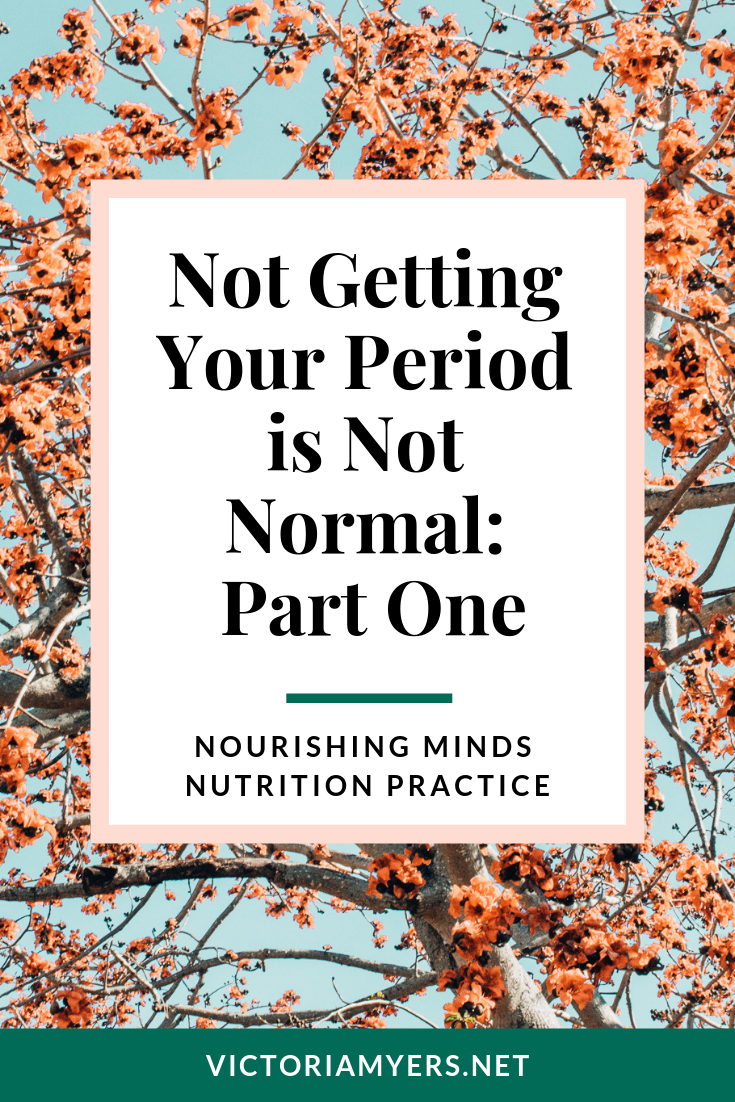Not Getting Your Period is Not Normal: Part One
By: Kelsey Pukala dietitian at Nourishing Minds Nutrition
Not getting your period is not normal. I’ll say that again… NOT getting your period is NOT normal. If you’re like me and went years without a period (and maybe still aren’t having a regular period), I encourage you to keep reading.
My goal with this post is definitely not to scare you in any way, but to help walk you through some things that I wish someone had told me years ago… that not having a regular period is not normal. I firmly believe that knowledge about your body is empowering and my hope with this post is to help you feel empowered to advocate for your health and get curious about what your body may be communicating to you.
The abnormal absence of menstruation (aka: not getting a period) is called amenorrhea. Amenorrhea can occur for several different reasons, some being a bit more in our control than others (I’ll write about these in detail in a future post). Unfortunately, in my experience, mentioning that I wasn’t getting a period to my doctors never seemed like a big deal. They would usually respond with… “well, if you’re getting at least a few periods a year, you’re fine” or “you’re just really active.”
Yes… yes I was active AND excessively exercising, restricting my food and not letting my body rest. Not once did a doctor ask me about what I was eating, my stress levels or my exercise routine.
I was prescribed birth control (which is fairly common for doctors to prescribe with amenorrhea) and sent on my way. Now, I am definitely not saying that I know more than doctors because that is absolutely not true! This is just what I experienced. However, in the past few years I have become very curious about this because there can be long-term consequences to not bleeding every month. Personally, as a patient, I was feeling like this was a big deal and wanted to do everything I could to get to the root of the problem, not cover it up with birth control.
**Side note: if you are getting your period on birth control, that’s not a guarantee that you will naturally bleed without it. Bleeding occurs with birth control or “the pill” as a withdrawal bleed. The only way to know if you can have a natural period without birth control would be to stop taking it and see if you are able to have a natural period without it. Nothing against birth control! You do what’s best for you. I do think it can be problematic when birth control is used for things other than it’s intended purpose of preventing pregnancy because it can mask amenorrhea.**
Estrogen and progesterone are the two major hormones responsible for menstruation. Both need to be adequately produced and balanced in order for you to bleed every 28 days (give or take). It’s actually incredible how they ebb and flow every month to prepare your body to CREATE A HUMAN. I know… amazing. Unfortunately, when estrogen and progesterone levels are too low (one possible cause for irregular menstruation), other body systems can take a hit. Bone health can deteriorate, infertility is a possibility and even an increased risk of cardiovascular disease later on can be caused by decreased estrogen production.
So, how can you keep your hormones happy? What I have included below is not an exhaustive list by any means. I just wanted to hit on a few key players when it comes to hormone regulation.
First of all, even if you are at a “healthy BMI,” that does not mean you are at a healthy weight for YOUR body. Obviously, we are all different and have different genetic set-point weights, but on average, women need about 23% body fat to maintain a healthy menstrual cycle. Some women can healthily menstruate at a lower body fat and that’s totally okay. Others will need a higher percentage of body fat, also okay. Your body is your body.
Secondly, carbs and fats are very important in the diet. We definitely need to be consuming enough calories, but we also need to consume adequate fats and carbs. As women, I think we often underestimate our own energy needs. Every month, our bodies are preparing themselves to create and sustain a human life. Every. Single. Month. Even if you’re not actively trying to get pregnant, your body doesn’t know that! It undergoes the same preparation processes for you just in case! That requires significantly more energy than we think it does. And partially explains why you may experience stronger hunger pangs the week before your period. Honoring our bodies by feeding them the energy they need is crucial for hormone regulation.
Lastly, I wish someone told me that stress and sleep play a CRITICAL role in maintaining healthy hormone levels. So, I’m sharing this with you now. Sleep is an important time for our bodies to rest, heal and balance hormones. Excessive stress can also mess with hormones. You may be thinking, “my life isn’t that stressful” (and if that’s you, please share your secret), but there are so many factors that can contribute to activating our stress response. Even “good” stress is stress on the body. Are you sleeping less than 7-8 hours a night, are you rigid/restrictive with food, are you exercising too much for YOUR body (see Victoria’s previous blog post for more on this!), or do you have work, family or financial stress?
If you answered yes to any of those questions, that could be adding stress to your body, even if you’re not physically feeling stressed. And, in turn, could be negatively affecting your estrogen and progesterone production. Obviously, it’s impossible to live a stress-free life. But, how can you balance the life-stress with rest?
You can definitely expect a part-2 to this post where I will go into more detail about all of these factors that play into hormone production and healthy menstruation.
Thank you so much Kelsey for that amazing blog post! You can learn more in her blog post part two in April. Until then, comment below and let us know your thoughts and questions.





